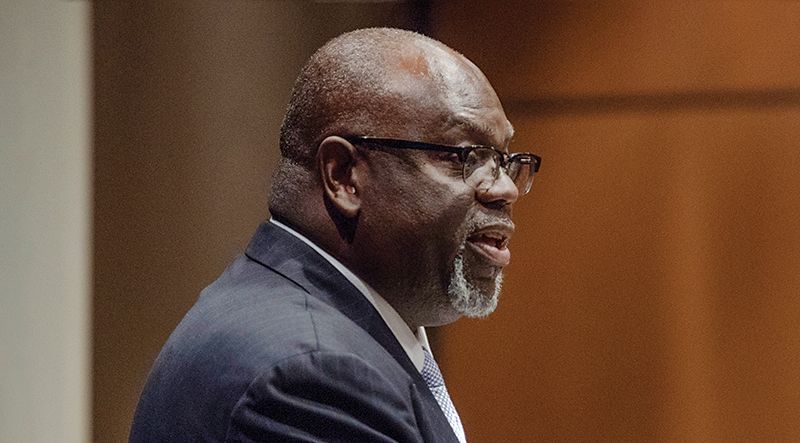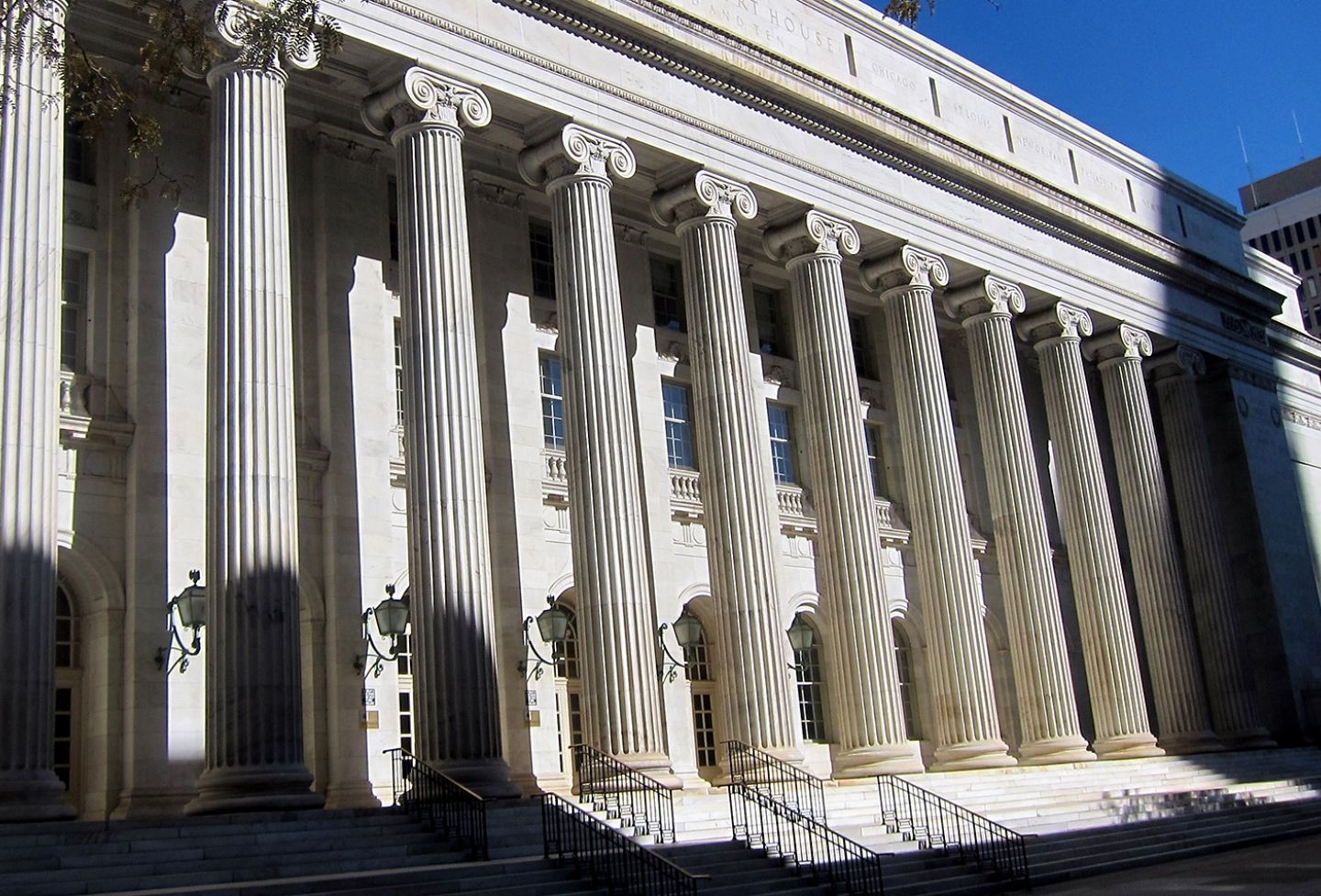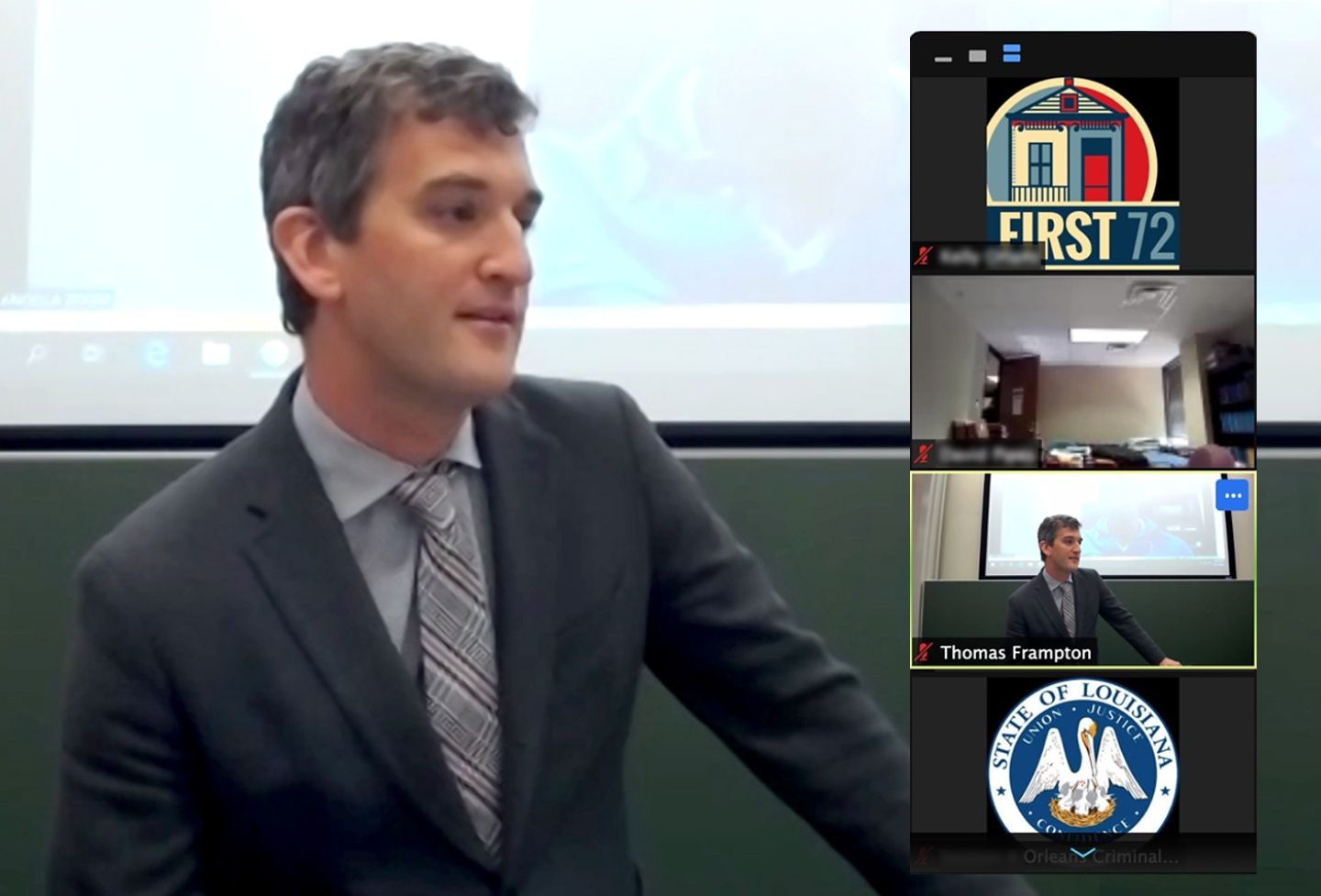UVA Lawyer recently asked some alumni who serve, or have served, on the front lines of criminal justice reform to talk about what’s working and what needs to change. Those taking part in our email roundtable were Judge Eric C. Taylor ’88 of the Superior Court of Los Angeles County, California; Timothy J. Heaphy ’91, former U.S. attorney for the Western District of Virginia and current counsel for UVA, who is co-teaching a Criminal Justice Reform Seminar this term; Tiffany Graves ’06, former executive director of the Mississippi Access to Justice Commission and current pro bono counsel at Bradley Arant Boult Cummings, who is also teaching at the Law School this year and serving as national appeals chair for Law School Foundation; Jim Hingeley ’76, a career public defender who was elected Albemarle County commonwealth’s attorney last year; and Maggie Birkel ’18, who advocates for women in the criminal justice system as an attorney with Still She Rises.
 In terms of criminal justice reforms, what seems to be working?
In terms of criminal justice reforms, what seems to be working?
Graves: A number of states are addressing the problem of pretrial detention by legislating bail reforms that end or severely restrict the use of money bail, and that has been an encouraging development. We should not put people in jail simply because they cannot afford to pay a certain amount of money to guarantee that they will attend a future court hearing. Money bail systems perpetuate an endless cycle of poverty and jail time for our low-income citizens while favoring those who are more well off. It is an ineffective and demoralizing function of many courts, and I am glad to see that some states have eliminated it or are working to do so.
<p><strong><img alt="Tim Heaphy" class="right" height="150" src="/system/files/uvalawyer/2020-fall/path-heaphy-150px-circle.jpg" width="150"></strong><strong>Heaphy:</strong> Virginia has taken some positive steps in the direction of reform, but much remains to be done. The General Assembly wisely repealed the law that imposed an automatic suspension of driver’s licenses due to failure to pay court debt. [This effort was spearheaded by numerous UVA Law alumni, working through the Legal Aid Justice Center, as reported in the Spring 2019 issue.] That provision was ineffective and overinclusive, and led to the reincarceration of thousands of Virginians whose licenses were suspended. The next frontier is repealing the mandatory fees, fines and costs that continue to be imposed regardless of ability to pay. These provisions criminalize poverty and should be eliminated.</p>
<p><strong><img alt="Eric Taylor" class="left" height="150" src="/system/files/uvalawyer/2020-fall/path-taylor-150px-circle.jpg" width="150">Taylor:</strong> In my opinion, the jury is still out, so to speak, on the extent to which various reforms in California have been effective. We’ve known for many years that reform was needed to restore confidence and equity in our criminal justice system. When I served on the California Judicial Council’s Access and Fairness committee almost 20 years ago, we were discussing this same issue — equity in prosecutions and sentencing. Those conversations were met with historical resistance. Today seems to be a political and social turning point, bringing a flood of changes to cash bail systems and, in our state, reforms to jury selection and the use of peremptory challenges. But it’s still early, and political will is like a pendulum that can easily change its trajectory. The pandemic and racial equality movement has brought dramatic shifts in pretrial jail populations. But any changes in crime rates and an eventual decline in COVID-19 concerns could stall that momentum. Only time will tell.</p>
<p><img alt class="right" height="150" src="/system/files/uvalawyer/2020-fall/path-birkel-150px-circle.jpg" width="150"><strong>Birkel:</strong> I work in Oklahoma. Oklahoma has the highest rate of female incarceration and the second-highest rate of incarceration of all humans of any state. Although I am a proponent of abolishing many of these systems that harm our clients’ lives, there are several initiatives that my office, Still She Rises, and other forces in the state have generated. For example, in 2016, Oklahomans voted to reclassify simple drug possession of any controlled substance as a misdemeanor, rather than a felony. Removing the possibility of prison time and moving in the direction of decriminalization has been crucial to more positive outcomes for our clients’ cases.</p>
Is there an accomplishment from your work that you would like to mention?
Heaphy: As a United States attorney, I helped devise and implement Attorney General Eric Holder’s Smart on Crime Initiative, which reduced the use of mandatory minimum charges and encouraged support for prevention and reentry initiatives. That program led to a reduction in the federal prison population with no corresponding increase in crime. After leaving government service, I founded The Fountain Fund, a Charlottesville-based reentry organization that provides low-interest loans to formerly incarcerated men and women.
<p><strong>Graves:</strong> Prior to joining my firm, I was the executive director of the Mississippi Access to Justice Commission. The commission hosted criminal record expungement legal clinics throughout Mississippi and joined forces with statewide nonprofit organizations that were examining Mississippi’s record expungement laws in order to make it easier for individuals to get their records expunged. I was pleased to be able to work with our legislators to make some rather sweeping changes to the state’s expungement laws, including by helping to enact a statute that increased the number of felony convictions that qualify for expungement and another statute that allows individuals to obtain an expungement if they committed certain crimes before they reached the age of 19. Having a clean criminal record enables individuals to do things like register to vote, obtain employment and federally supported housing, and acquire essential state sponsored benefits, among other things. It can be life-changing for people who are trying hard to rebuild their lives to better support themselves and their families.</p>
Taylor: California Chief Justice Tani Gorre Cantil-Sakauye has led the fight, along with the State Judicial Council on which I serve, to reform our state’s cash bail system. Fortunately, she had the support of Gov. Gavin Newsom and our Legislature. During this effort, the pandemic struck, causing local county trial courts to reduce jail populations in order to avoid the spread of the virus. Los Angeles County has released over 20% of its jail population. Those released were vetted through a collaborative effort between prosecuting and defense agencies, and then approved by the court. We sought to release those who did not present a significant risk to the public. Given the size of our justice system, we’ve been pleased so far with the approach.
 Hingeley: A major accomplishment I would mention is assisting in managing the criminal justice system response to the ongoing public health emergency. My office has used a variety of strategies (home electronic incarceration, delayed reporting dates, furloughs, release on bail and modified sentences) to reduce the population of the Albemarle County Regional Jail without compromising public safety. (The superintendent of ACRJ, Col. Martin Kumer, has been a terrific ally in this effort.) The reduction has been significant, bringing the ACRJ population to a level lower than it has been in decades. The population reduction reduces the risks of transmission and provides more space in the jail to effectively manage outbreaks when they do occur.
Hingeley: A major accomplishment I would mention is assisting in managing the criminal justice system response to the ongoing public health emergency. My office has used a variety of strategies (home electronic incarceration, delayed reporting dates, furloughs, release on bail and modified sentences) to reduce the population of the Albemarle County Regional Jail without compromising public safety. (The superintendent of ACRJ, Col. Martin Kumer, has been a terrific ally in this effort.) The reduction has been significant, bringing the ACRJ population to a level lower than it has been in decades. The population reduction reduces the risks of transmission and provides more space in the jail to effectively manage outbreaks when they do occur.
I also cooperated with the courts when they were closed (except for emergency hearings) to implement innovative hearing procedures that enabled more judicial business to be conducted during closure and reduced the backlog of delayed cases now starting to clog the system.
What more would you like to see change? What are you doing in that regard?
Taylor: Equity in arrests and prosecutions across cultural and socioeconomic lines has always been essential to building trust in any justice system. In any society, this is always a challenge. I’d like to see more studies followed by meaningful efforts to give every person a reason to believe that justice is blind. I know that most people I’ve worked with, including judicial officers and our justice partners, strive for this. We constantly reflect on how we can be more fair, and in my past two decades on this court, I have created training on implicit bias. I think California is well-positioned to bring about that change. All three branches of our government have made reform a priority.
<p><strong>Birkel:</strong> I would like to see the decriminalization or at least reduction from felony level to misdemeanor level for numerous charges. As a prison abolitionist, I would like to see the elimination of the prison and criminal legal system. In the meantime, as a public defender, I fight every day, side by side with my clients against a system that seeks to tear apart families and tear down individuals.</p>
Hingeley: I would like to see criminal justice reform legislation pass the General Assembly. I am one of the founding members of the Virginia Progressive Prosecutors for Justice, an organization that advocates for criminal justice reform. We are 12 elected commonwealth’s attorneys, and collectively we represent 43% of the population of Virginia. We assist in developing proposals for criminal justice reform and drafting criminal justice reform legislation, and we speak out to legislators and the community on criminal justice reform. Our voice is being heard in debates that will shape the future of Virginia’s criminal justice system.
Heaphy: I’m terribly disappointed in the leadership at the Department of Justice in this administration, which has withdrawn from Smart on Crime and politicized the department. This trend shows that elections matter and have consequences for criminal justice policy. Conversely, the Virginia General Assembly has taken some positive steps in the direction of reform and seems poised to consider and enact more fundamental changes to improve the quality of justice in Virginia. The Fountain Fund is calling attention to fees/fines issue and helping generate data that we hope will inform policy efforts going forward.
Graves: There is a lot that needs to change. As with most things, it starts with an awareness that we can no longer operate under the current criminal justice system and that reform is needed. The murders of George Floyd, Breonna Taylor, Ahmaud Arbery and many others before them, have highlighted the need for reform and awakened the nation’s consciousness to just how bad things are and can be if we fail to make the types of changes that will literally save lives — Black and otherwise. As pro bono counsel at my firm, I am constantly looking for ways that we can mobilize our attorneys to help, and we are currently considering several projects that would more directly position our attorneys into criminal justice work. None of these changes will happen overnight. They require a sustained commitment. They also require a willingness to work with returning citizens and families of incarcerated and formerly incarcerated individuals to help identify the changes that will have the biggest impact.
A JUDGE’S CALL TO END QUALIFIED IMMUNITY

<p><em>Photo by Sanjay Suchak/UVA Communications.</em></p>
The facts of the case pointed to a likely constitutional violation. In 2013 a white Mississippi police officer, Nick McClendon, pulled over a Black man, Clarence Jamison, and conducted an almost two-hour traffic stop. Jamison was driving a recently purchased Mercedes- Benz with temporary tags that the officer claimed were folded (Jamison provided evidence that they were not). McClendon allegedly badgered him to search the car, despite background checks that failed to turn up a criminal history on Jamison. The officer added a false pretext, claiming cocaine had been reported in the vehicle. Upon the fifth request to search, the driver capitulated. The officer dismantled the car, reportedly causing thousands of dollars’ worth of damage. The search, augmented with a drug-sniffing dog, failed to produce any hidden drugs.
Despite the unreasonableness of the search and apparent profiling, U.S. Judge Carlton Reeves ’89 of the U.S. District Court of the Southern District of Mississippi ruled Aug. 4 in the officer’s favor in Jamison v. McClendon, because of how the courts apply qualified immunity, while questioning the doctrine.
Reeves pointed out in his opinion that immunity is different than exoneration, and listed cases in which police were believed to have abused their power, and yet were protected from accountability.
“Our courts have shielded a police officer who shot a child while the officer was attempting to shoot the family dog; prison guards who forced a prisoner to sleep in cells ‘covered in feces’ for days; police officers who stole over $225,000 worth of property; a deputy who body-slammed a woman after she simply ‘ignored [the deputy’s] command and walked away’; an officer who seriously burned a woman after detonating a ‘flashbang’ device in the bedroom where she was sleeping; an officer who deployed a dog against a suspect who ‘claim[ed] that he surrendered by raising his hands in the air’; and an officer who shot an unarmed woman eight times after she threw a knife and glass at a police dog that was attacking her brother.”
The doctrine of qualified immunity, the U.S. Supreme Court has held, protects police officers when sued for alleged constitutional violations arising from performing their jobs. In acknowledging the uncertainty inherent to policing, the court has set a high bar for an officer to be sued: Not only must he violate a plaintiff’s constitutional rights, but those rights must be “clearly established” under existing law at the time of the incident.
“Unless the courts have previously held that very similar police misconduct violated the Constitution, the officers will be shielded from liability, even though they violated the plaintiff’s rights,” said Professor Thomas Frampton, a criminal law expert who studies racial disparity in criminal justice. “And, in practice, rarely are two cases so similar that plaintiffs can surmount this hurdle.”
Frampton said Reeves was trying to get the Supreme Court’s attention.
“There is a growing national debate about police misconduct, and the doctrine of qualified immunity has critics on both the left and the right,” Frampton said. “Judge Reeves’ opinion adds a powerful, even lyrical, voice to that conversation.”
Reeves compared qualified immunity to the wrongheaded doctrine of “separate but equal,” which was ultimately struck. The Supreme Court declined to review immunity cases as recently as June.
The judge’s opinion received extensive press coverage. “While I did not expect the opinion to receive the attention it has, I am not surprised in light of the national conversation on policing that we are having,” Reeves told UVA Lawyer in late September.



